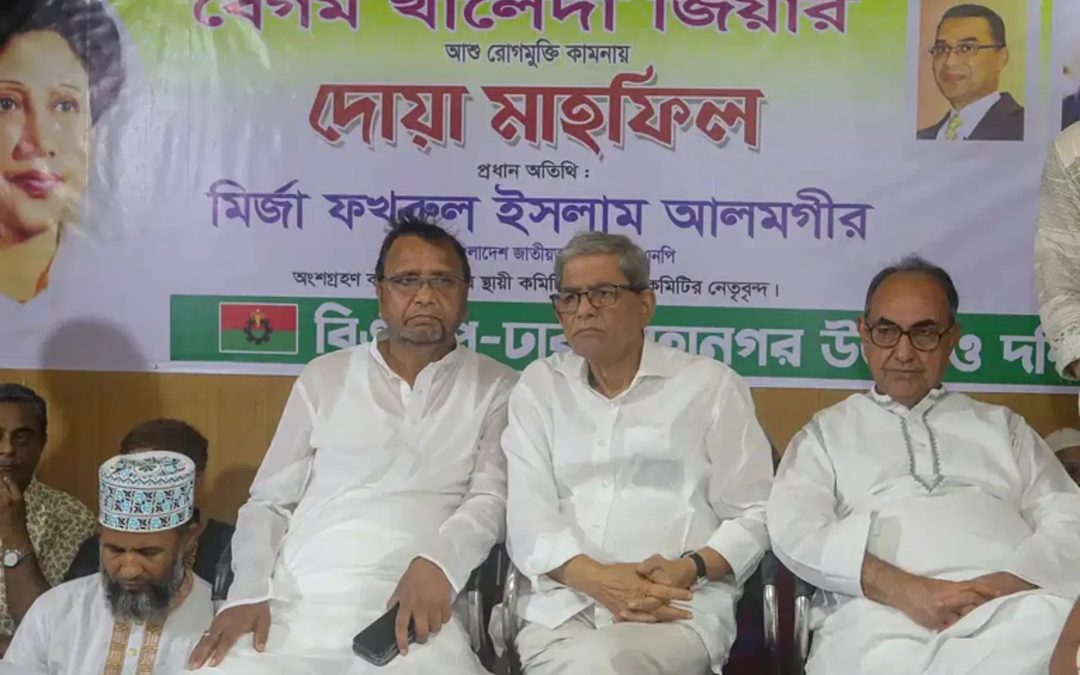Mirza Fakhrul prayed for Khaleda Zia’s recovery at a prayer gathering at Bhashani Bhaban in the capital, Nayapaltan | Photo: Prothom Alo
Dhaka, July 9, 2024 —
Mirza Fakhrul Islam Alamgir, Secretary General of the Bangladesh Nationalist Party (BNP), has alleged that the government is favoring India’s interests at the expense of Bangladesh to hold onto power.
He expressed these concerns during a prayer meeting held on Tuesday evening at Bhashani Bhaban in Nayapaltan.
The event was held to pray for BNP Chief Khaleda Zia’s health.
“Our fair share of water is not coming from the Teesta River or the Farakka Barrage.”
Fakhrul claims that Bangladesh is being unjustly denied access to one hundred and forty-four of the rivers they share with India.
“Our government hands over India permanent railway connections and other facilities at the same time without making sure our nation gains any significant advantage.”
The policy will not protect this country’s interests, he said.
The prayer event, arranged by the BNP’s Dhaka Metropolitan North and South branches, also served as a platform for political mobilization.
Fakhrul accused the ruling Awami League of undermining democratic institutions while claiming to uphold democracy.
They’ve ruined the economy, disrupted elections, and taken over the government.
He argued that their dominance will damage Bangladesh.
Fakhrul called on party members to stand united against what he referred to as authoritarian rule.
Together, we can bring down this regime.
He underlined the need for more vigorous rallies and active citizen involvement, claiming that defeating the Awami League would safeguard our country’s future, the freedom of its leaders, and the restoration of democracy.
BNP Standing Committee member Mirza Abbas echoed this sentiment, encouraging people to resist oppression.
“Bangladeshis are fighters, not silent.
He encouraged people to remain dedicated, saying, “We need to take this movement to its final phase.”
Event moderators were Dhaka Metropolitan South and North BNP Members Secretary Tanvir Ahmed and Aminul Haque.
Other speakers included Abdus Salam, advisor to the BNP Chairperson; Saiful Alam, Dhaka Metropolitan North Convener; and Rafiqul Alam, Dhaka Metropolitan South Convener.
Political Divisions Run Deep
Bangladesh’s political environment remains sharply divided.
The BNP frequently accuses the Awami League of eroding democratic principles and suppressing opposition voices.
On the other hand, the Awami League defends its policies, asserting they are essential for development and national stability.
One major point of contention is the unresolved issue of water-sharing agreements with India.
Despite years of negotiations, critical deals like the Teesta Water Sharing Treaty have yet to materialize.
The opposition often cites this as evidence of the government’s failure to protect Bangladesh’s interests.
Additionally, infrastructure projects, such as railway and energy collaborations with India, have sparked debate, with critics arguing that these agreements disproportionately benefit India while offering little in return for Bangladesh.
As the country approaches elections, political tensions continue to rise.
The BNP has been vocal about the need for a neutral caretaker government to oversee the electoral process, adding another layer of conflict to the already charged political atmosphere.
With public protests gaining momentum, the nation could be heading into a period of heightened political activity and potential unrest.
The BNP’s recent efforts reflect their determination to challenge the ruling party and galvanize public support.
It remains to be seen if these actions will result in significant political changes, but the stakes for all involved are undeniably high.

